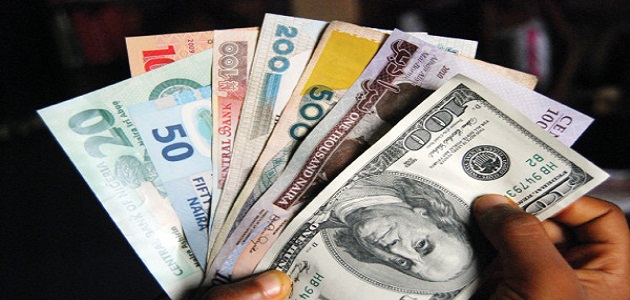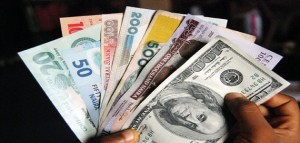

Central Bank of Nigeria, CBN, has reaffirm its determination to sustain the resurgence of the Naira via continuous provision of foreign exchange to ensure Naira gains further strength as well as been available to end users. This is as the apex bank reiterated that there is adequate amount of foreign exchange to meet the needs of bank customers seeking to purchase dollars for purpose of Personal Travel Allowance, Business Travel Allowance, and payment of school and medical fees. It would be recalled that, in its sustained effort to further boost the Naira, the CBN had directed the Deposit Money Banks (DMBs) in the country to sell foreign exchange obtained from it to retail end-users at not more than N360/$1 for invisibles while also crashing the rate at which it sells forex to Bureaux De Change (BDCs) in Nigeria to N360 and directed the BDCs to sell to end users at not more than N362/$1.
Acting Director, Corporate Communications Department, CBN, Mr. Isaac Okoroafor disclosed these this development saying the apex bank from next week will commence twice weekly forex sales to BDCs and that a new exchange rate will be announced on Monday April 3rd, 2017. “Licensed BDC operators are therefore required to fund their accounts with the CBN on Mondays and Wednesdays, while they receive their purchases on Tuesdays and Thursdays respectively. The sale amount to BDCs is hereby increased to $10,000 weekly ($5,000 per bid) and a new rate will be announced soon,” he said.
While commending the CBN for their effort, experts appealed to the apex bank to eliminate the multiple rates in the market. As the Naira continues to appreciate, experts say it is necessary for the CBN to adjust applicable rates in different segments of the market in the overall interest of the economy.
In the process, the leader of bureau de change operators in Nigeria said his members lost N130 million due to the mode of Central Bank’s intervention in the past week. This may not be unconnected to the reason why bureaux de change operators are now reluctant to purchase dollars from the public due to fear of further appreciation of the naira. According to an operator, BDC are expecting the CBN to review the rates and so for now nobody is willing to buy, except the seller is willing to sell at any rate agreeable to the BDC. Similarly, President, Association of Bureaux de Change Operators of Nigeria, (ABCON), Alhaji Aminu Gwadabe said: “The situation is really frustrating. With the dollar selling at N380 in the parallel market, how can we sell at N400 per dollar? “It is now unfair that the CBN has reduced the bank rate for invisibles to N360 per dollar. We hope that they will review the selling rate to BDCs.”, otherwise it would be difficult for our members to participate in the CBN’s weekly dollar sale.” However, a CBN source, who spoke on anonymity, told Vanguard that the apex bank will for now still sell dollars to BDCs at N381 per dollar; he added that this is because the dollars sold to BDCs are sourced from International Money Transfer Organisations (IMTOs). “If the CBN reduce the rate, it will not be attractive to the IMTOs to supply dollars to fund the weekly sale to BDCs again,” he said.
This action comes after directors from the International Monetary Fund (IMF) praised the apex bank for easing foreign exchange restrictions in Nigeria. “Directors underscored that external adjustment is necessary to protect foreign currency buffers and reduce vulnerabilities,” IMF said in a statement after its Article IV consultations in Nigeria. They commended the recent easing of some exchange restrictions and urged the authorities to remove the remaining restrictions and multiple currency practices, thus unifying the foreign exchange market and helping regain investor confidence. “Directors emphasized that these policies should be supported by tighter monetary policy and fiscal consolidation to anchor inflation expectations and to limit the risk of exchange rate overshooting, as well as structural reforms to improve competitiveness.”
Although this could be cheering news for importers and a good step in a bid to recover the economy, reports gathered suggests that the Naira continuous fight back against major currencies, especially the United States dollar, which exchanged has caused apprehension among speculators, who anticipate losses in the face of continued crash. As a matter of fact the Members of the Organised Private Sector (OPS), including Manufacturers’ Association of Nigeria (MAN), disagreed with the Central Bank of Nigeria (CBN) that they received $2.83b forex. The OPS insisted that manufacturers could not have been the sole beneficiary of the $2.83 billion, if indeed such funds were disbursed, as the other sectors of the economy would have been major partakers in the largesse.
The OPS however said, “Forex allocations have been marred with alleged irregularities. Only prominent manufacturers allegedly have access to forex. Thousands of manufacturers were forced to shut down their businesses and relocate to neighbouring countries”. MAN has been critical of the forex policy and the ban on 41 items classified as raw materials that could be sourced locally, contending that such policies was not only hurting its members but the economy. Other hurdles the manufacturers said that are being faced with include power instability, security challenges and multiple taxation, all of which, it said, pushed up production costs in the country. MAN President, Dr. Frank Udemba Jacobs, who faulted the CBN position on the controversial $2.83 billion allocation, said it was incorrect for the CBN to claim to have allocated such funds to manufacturers. According to him, the regulator ought to have explained how the $2.83 billion was shared to beneficiaries in the past two months. Responding to the accusation of round tripping leveled against some manufacturers and how the association could monitor the ultilisation of the forex allocated to them, the MAN president said the allegation was baseless.
Also, the Director-General of the Lagos Chamber of Commerce & Industry (LCCI), Mr. Muda Yusuf argued that the CBN should be blamed for the alleged round tripping by ‘manufacturers’. According to him, the regulator incentivised the illegality, thus making it attractive for those who may be engaged in it. Yusuf said, “The black market rate for the dollar as at today (weekend) is N460 to a dollar. What the bank should do is to close the gap with the official rate which hovers around N300 to make round tripping unattractive if indeed it is happening. The disparity between the official and black market rate created incentive for round tripping.
“Anybody can claim to be a manufacturer. What the CBN should do is to allow the market to determine the rate and value of the naira. Some government policies are also hurting the economy. For instance, people should be allowed to bring in their forex freely without restrictions. “The government has placed a lot of hurdles on the path of portfolio investors and Foreign Direct Investment (FDI). There is no way we can come out of the economic problems bedeviling the nation except there is a review of some of these hurtful policies.
Meanwhile, Vice President Yemi Osinbajo has said that there was bound to be corruption in the land due to the arbitrage in the forex which is so large. He, however, offered hope that the monetary and fiscal policies were being aligned, adding that “we are constantly in discussion with the CBN, discussing on how to reduce interest rates”. According to Osinbajo, “I think it is very important, especially for us who are in government today either as legislature or executive. We have to address this issue, it is a fundamental issue; everywhere in the world, even where they do not have the problems we have, they are addressing the issue. “So we must address it and, it is everywhere; look at foreign exchange and you can identify the problems, you fix the rate of foreign exchange at the rate it is and you know what the black market is, look at the arbitrage which is so large; there is bound to be corruption, it is impossible for there not to be corruption”.
